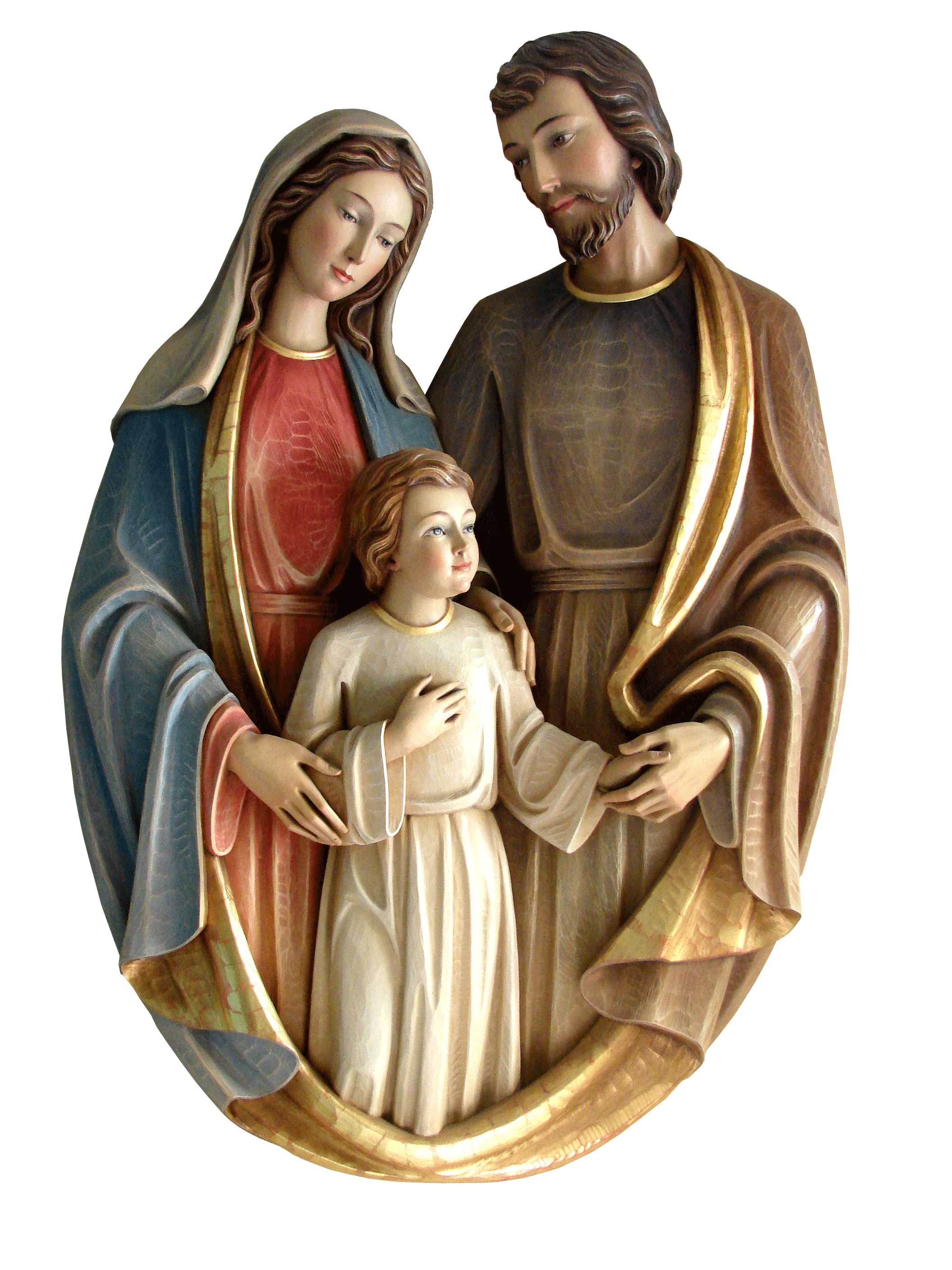FAMILY LIFE THROUGH THE EYES OF MARY & JOSEPH

Genesis 15: 1-6, 21: 1-3; Psalm 105 1-9; Hebrews 11:8,11-12,17-19; Luke 2: 22-40
Alternative Readings: Sirach 3: 2-6, 12-14; Colossians 3: 12-21
Introduction: If you were going to make a list of the great loving couples of history, who would be on your list? Romeo & Juliet? Anthony & Cleopatra? Mary & Joseph would probably not be on your list, for when we think of them we don’t normally think of them in that way because the spotlight is on Jesus, where it should be. But I think that if we examine the love of Mary & Joseph, we would realize it was a love that stands the test of time. The love they had for each other, coupled with the love they had for God, culminates in one of the greatest love stories ever told.
Reflection: God, as a Father, created a human family of sons and daughters in His own image and likeness, to rule over His Creation. His plan was to have a human family, filled with the fullness of His Spirit, rule on earth as He did in heaven. When Adam and Eve sinned, they became separated from God. This naturally affected their descendants as well.
God created the human family to reflect and demonstrate the perfect relationship that existed in the Holy Trinity. The family was to be a place of intimacy, unity, love, and understanding. It was to be the place of total trust and obedience, of absolute safety and security. This, unfortunately, is not the case in many families today because of the effects of sin. Instead of experiencing love, peace and joy and enjoying the protection of the family the most vulnerable people are experiencing physical, sexual and emotional abuse.
Many problems facing the world today result from a break-up in family relationships. This is mostly because parents have failed in their spiritual roles. The family should be the place where a child is taught the Word of God and grows up to lead a Christ like life (Prov 22:6; Deut 28:43). Parents have a responsibility to teach their children the Word of God. The Scriptures when read, taught or studied, and obeyed just like Mary & Joseph will transform lives to such an extent that families will enjoy a loving, intimate, forgiving and understanding relationship. Let’s reflect on the life of Mary & Joseph.
- FAMILY LIFE THROUGH THE EYES OF MARY (Luke 1:26-38)
Who was Mary? The evidence about Mary points to a humble, godly Jewish upbringing. Mary’s father, apparently, was a descendant of the great King David. She was the cousin to Elizabeth. Perhaps of the tribe of Levi, perhaps a descendant of David since her mother was from Bethlehem. Parents were Joachim of Nazareth and Anna of Bethlehem. Sister was Salome, wife of Zebedee, mother of James and John.
What was Her Character? Woman of Faith, spiritual, obedient, willing servant. One who had an attitude of Praise.
What was Her Assignment? To give birth to and be the mother of God’s Son.
Mary’s first impressions as a child probably centered on devotion to God and to God’s Word. Gabriel makes it clear that she was chosen by God. As Mary listened to the angel, she must have wrestled with the consequences that would come in her life if she accepted God’s call. As she listens to the angel, Mary says, “I am the Lord’s servant. May it be to me as you have said.” (Luke 1:38) Within Mary’s decision to be fully submissive to the call of God was her willingness, if need be, to suffer ridicule and contempt and loneliness.
- FAMILY LIFE THROUGH THE EYES OF JOSEPH (Luke 1:26-38)
Who was Joseph? Tradition says that Joseph was an older man, a taxpayer (Lk 2:1-5), common man, carpenter – probably good with details.
What was His Character? Sexually Pure (Mt. 1:18), Man of Integrity (Mt. 1:19). Man of Faith; Sensitive (Mt. 1:19), Level-headed (Mt. 1:20) – thought about and reflected on situations rather than simply reacting, Spiritual (Mt. 1:20, 2:13) – he is in touch with his God, Obedient (Mt. 1:24,25; 2:13,14) willing servant – willing to obey, not close-minded to something that had never been done before.
What was His Assignment? He was chosen by God to be the earthly father to Jesus. He was the man God chose to raise His son. He was content to be a role player and not the star attraction.
Notice what Mary and Joseph did. At every curve in their life they chose to trust God. They chose to express faith in God. They chose to do the right thing, the ethical thing of following the law, no matter how difficult it might be. They chose to trust God for guidance and provision. Joseph and Mary chose to express their faith by obeying God.
CONCLUSION – Have there been any unexpected curves in your life lately? Is there tension and stress because of these unexpected curves? Mary and Joseph knew about curves in the road. In fact, the Christmas story is a story with unexpected events and curves in the road. The whole story involving these two individuals is a story of trust. Joseph had to trust Mary. Mary had to trust angel Gabriel. Joseph had to trust God. Both Mary and Joseph had to say to God, “I am your servant. Whatever it costs, wherever it takes me, I will do it.”
God continues to look for women and men like Mary and Joseph. People who will pursue obedience, whatever the cost. People who will trust God – even though the outcome seems unsure. God raises up people for his purposes. And God is looking for people humble enough to give him all the glory.
“The future of the Church is the family. When families demonstrate God’s character, His compassion and love in their lives, these will be reflected in the Church. The spiritual growth of families affects the Church in the same way the spiritual growth of the Church affects the families that make up the Church”.








